考研英语周计划【重点核心词汇+练习题详解】(第5周)【圣才出品】
- 格式:pdf
- 大小:719.89 KB
- 文档页数:28

启航考研英语单词周计划Sure, I can help you come up with a weekly plan to learn and review English words for the graduate entrance exam. Here's a plan for you:Day 1: Start with a review of basic English vocabulary, including common words used in everyday conversation. Make flashcards for any new words you come across and reviewthem throughout the day.Day 2: Focus on academic vocabulary related to yourfield of study. Look up key terms and definitions in academic journals and textbooks. Create a list of these words and practice using them in context.Day 3: Expand your vocabulary with synonyms and antonyms. Find a list of common synonyms and antonyms and make flashcards to quiz yourself throughout the day. Practice using these words in sentences to reinforce your understanding.Day 4: Dive into specific exam-related vocabulary. Look up past exam papers and identify any recurring vocabulary.Create flashcards for these words and practice using them in sample exam questions.Day 5: Review and consolidate. Take some time to go over all the words you've learned throughout the week. Test yourself with a vocabulary quiz or ask a friend to help you review.Day 6: Focus on mastering the pronunciation of difficult words. Use online resources or language learning apps to practice pronouncing challenging words correctly. Record yourself speaking and compare it to native speakers to improve your pronunciation.Day 7: Relax and enjoy some English-language media. Watch a movie, listen to a podcast, or read a book in English to expose yourself to natural language use and expand your vocabulary in a more relaxed setting.中文:这是一个学习和复习英语单词的周计划。
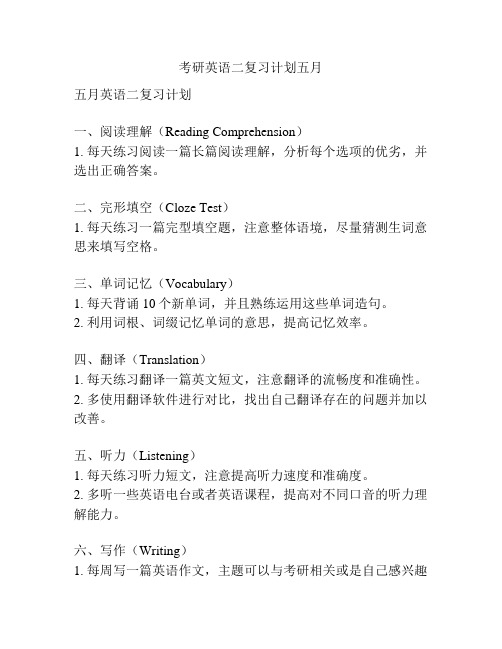
考研英语二复习计划五月
五月英语二复习计划
一、阅读理解(Reading Comprehension)
1. 每天练习阅读一篇长篇阅读理解,分析每个选项的优劣,并选出正确答案。
二、完形填空(Cloze Test)
1. 每天练习一篇完型填空题,注意整体语境,尽量猜测生词意思来填写空格。
三、单词记忆(Vocabulary)
1. 每天背诵10个新单词,并且熟练运用这些单词造句。
2. 利用词根、词缀记忆单词的意思,提高记忆效率。
四、翻译(Translation)
1. 每天练习翻译一篇英文短文,注意翻译的流畅度和准确性。
2. 多使用翻译软件进行对比,找出自己翻译存在的问题并加以改善。
五、听力(Listening)
1. 每天练习听力短文,注意提高听力速度和准确度。
2. 多听一些英语电台或者英语课程,提高对不同口音的听力理解能力。
六、写作(Writing)
1. 每周写一篇英语作文,主题可以与考研相关或是自己感兴趣
的话题。
2. 注意使用合适的句式和词汇,多使用高级词汇和复杂句型。
七、语法(Grammar)
1. 复习英语的基本语法知识,并且掌握一些常见错误的修正方法。
2. 多做语法题,提高对语法知识的应用能力。
八、模拟考试(Practice Papers)
1. 每周模拟考一次,模拟真实考试环境,检验自己的水平和复习效果。
2. 分析错题原因,找到自己的薄弱环节并进行有针对性的复习。
以上计划仅作参考,根据自己的实际情况进行调整。
在复习过程中,要保持积极的心态和坚持不懈的努力,相信自己一定能够取得好成绩。

考研英语周计划分级词汇记忆宝典电子全文共6篇示例,供读者参考篇1Title: The Magical Memory Book for Big Word Adventures!Hey there, word explorers! Are you ready for an exciting journey into the world of big, juicy words? Get ready to become a vocabulary master with this fantastic weekly plan. It's like having your very own magical memory book that will help you conquer those tricky words for your big English exams!Monday: The KickoffMondays are all about making a fresh start. Grab your magical memory book (or a regular notebook if you haven't found the magical one yet) and write down the new words you want to learn this week. Don't worry if there are a lot of them –we'll tackle them one step at a time!Now, let's get to know these new words a little better. Look up their meanings and try to understand them. If you're feeling extra adventurous, you can even draw little pictures or doodles next to the words to help you remember them better. Whoknows, maybe your doodle of a "microscopic" ant will help you never forget that word!Tuesday: The Rhyme TimeTuesdays are for getting those words stuck in your head with some silly rhymes and songs! Come up with funny phrases or little tunes to help you remember the words and their meanings. For example, you could sing "The 'anonymous' person has no name, but their secret message still came!" before you go to bed.Wednesday: The Story SpinOn Wednesdays, we'll weave the words into exciting stories! Take a few of the new words and create a wild, imaginative tale using them. Maybe you'll write about a "diligent" student who solves a "perplexing" mystery while avoiding the "disdain" of their grumpy neighbor. The sillier the story, the better you'll remember those big words!Thursday: The Game ZoneThursdays are all about turning word practice into fun and games! You can play charades with your family, acting out the meanings of the words without speaking. Or, you could have a rhyming competition, taking turns coming up with rhymes foreach new word. Who knows, you might even invent a brand new game that's both educational and entertaining!Friday: The Review RodeoFridays are for reviewing all the words you've learned so far this week. Make flashcards, take practice quizzes, or even have a friendly competition with your friends or siblings to see who can use the most new words in a sentence or story.Saturday: The Real-World RompOn Saturdays, it's time to take those words out for a spin in the real world! Pay attention to conversations, books, movies, or even signs and labels around you, and see if you can spot any of the new words you've learned. Hearing and seeing them used in different contexts will help cement them in your memory.Sunday: The Celebration StationSundays are for celebrating your hard work and progress! Treat yourself to your favorite snack or activity as a reward for all your word-learning efforts this week. You've earned it, word explorer! And don't forget to give your magical memory book a high-five – it's been working overtime to help you become a vocabulary superhero.And there you have it, fellow word adventurers! Follow this weekly plan, and those big, scary words won't seem so intimidating anymore. With a little bit of creativity, fun, and determination, you'll be unstoppable on your quest to conquer the vocabulary for your big English exams. So grab your magical memory book, and let's get started on this exciting journey together!篇2A Weekly Vocab Plan for Big Kid School EnglishHi friends! Today I'm gonna share my awesome plan for learning lots of new English words to get ready for big kid school. My goal is to do really well on the English test for grad school. That's a fancy name for the school you go to after college to learn even more stuff!The first step is making word lists. Every Sunday, I go through my vocab books and pick out 20-25 new words I don't know yet. I write them down in my special vocab notebook. Having the words in one place makes it way easier to study them during the week.Next, I look up each word in the dictionary and write down the definition, part of speech, and a simple example sentence.Dictionaries are like vocab superheroes - they have all the answers! The definition tells me what the word means. The part of speech lets me know if it's a noun, verb, adjective, etc. And the example shows me how to use it in a regular sentence.Then I make flashcards for all the words. On one side I write the word, and on the other I put the definition, part of speech, and example. Flashcards are my favorite tool for memorizing new terms. I can quiz myself over and over until the words really stick in my brain.Each day after school, I spend 30 minutes reviewing my flashcards and repeating the words out loud. Hearing myself say them helps me remember better. If there are words I keep forgetting, I make a note to spend some extra time on those ones.I also try to use as many of the new vocab words as I can when writing sentences or paragraphs. Using the words in my own writing makes them easier to understand and helps make sure I know how to use them correctly.Another smart trick is finding the roots, prefixes, and suffixes in words. Like "uni" means one, so "unicorn" is a one-horned animal. Breaking words into their meaningful parts gives meclues about their definitions and makes them simpler to memorize.On Saturday, I take a practice quiz to test how many of the new terms I've learned that week. I give myself a big sticker or treat for every word I get right to celebrate my hard work!Then on Sunday, it's time to pick a fresh set of 20-25 new words to start the cycle again for the next week. Consistency is key - repeating these steps every week helps me acquire vocabulary a little bit at a time without getting overwhelmed.Learning all these big grown-up English words can definitely feel like a lot of work sometimes. But I remind myself that it's an investment in my future goals and dreams. Maybe I'll become a scientist and need to read lots of academic papers. Or maybe I'll write books someday and need a giant vocabulary to tell my stories. Or maybe I'll end up teaching English to kids just like me one day!No matter what path I choose, a strong mastery of English vocabulary will open up so many amazing opportunities for me. That's what motivates me to stick with my weekly vocab plan. I'm exercising my brain and giving it the language skills to explore the world. How cool is that?Okay vocabulary lovers, those are my tips for building your word power step-by-step. Let me know if you have any other genius ideas to share! Now get out there and start learning - the English language awaits!篇3Hello friends! Today I want to share with you my super awesome plan for learning all the big vocabulary words for the graduate English entrance exam. I'm going to be a master of words by the time I take that test!First, you need to get yourself a nice big notebook just for vocabulary words. Decorate the cover with your favorite stickers and drawings to make it fun. Inside, make a page for each letter of the alphabet from A to Z. That's where you'll write down all the new words you learn.Every week, I pick out 25 new vocabulary words to focus on. I write them all down on the correct alphabet page in my notebook. For each word, I write down the definition or translation in my own language. That way I can quickly see what it means when I'm studying.Then comes the really fun part - making those words stick in my brain! There are lots of cool ways to practice new vocabulary.One thing I like to do is make flashcards. I write the word on one side and the definition on the other. Flashcards let me quiz myself or have someone else quiz me.Another neat trick is using the words in silly sentences or stories. Like if one of the words is "perambulate", I might say something like "The perambulating penguin waddled down the street with his umbrella." Making up goofy sentences helps the words stick better in my mind.You can also look for connections between the new words and things you already know. Like if the word is "combustible", you might think about fire, matches, and things that can burn. Building those links makes it easier to remember.My favorite way to practice though is with games! You can play hangman, competitive wordscrambles, or make up rhymes and raps using the vocab words. Turning it into a game makes studying way more fun.Don't just practice on your own though - get your family and friends involved too! Maybe your parents can quiz you over breakfast. Or you can teach the new words to your little brother or sister and have them test you later.It's also really important to keep reviewing and refreshing on old words, not just practicing the brand new ones each week. I keep a section in my notebook for words I've already learned, and I'll flip back through those pages too when I'm studying.Some words will stick right away, but others might take a while before you really have them locked into your brain. Don't get frustrated - just keep at it! The more creative and consistent you can be with your practice, the faster everything will stick.Oh, and here's a pro-tip! Use those fancy vocabulary words as much as you can in your everyday life. Like you could say "The delectable aroma from the kitchen is enticing me to inquire about the appetizing meal you are preparing." See how I worked some big words in there? It'll really impress your parents and teachers.With a few months of studying like this, I'll be the vocabulary master of my class. Those entrance exam words won't stand a chance against me! Just you wait, I'm going to perambulate right into that graduate program. Okay, maybe I've got a little more practicing to do on that one. But I'm well on my way!Let me know if you have any other awesome study tricks for learning piles of new vocabulary. Us word nerds have to sticktogether! Okay, time for me to get back to my flashcards. Vocabulary, here I come!篇4Vocabulary Categorization and Memory Strategies for GRE PreparationHey kids! Are you getting ready to take the GRE someday to get into a fancy graduate school? Well, one of the biggest parts of the GRE is the vocabulary section. There are tons of big, strange words you'll need to know. But don't worry, I'm here to help make learning those words fun!First off, you'll want to break the words down into categories. Categorizing the words can make them much easier to remember. Let's go through some examples of categories you can use:Word RootsLots of big vocabulary words have roots from other languages like Greek or Latin. If you learn some common roots, it'll unlock the meanings of tons of words! For example, the root "bio" means life. So "biology" is the study of life, and "biography" is the story of someone's life.Word FamiliesSimilar to roots, you can group words into families based on a shared root or prefix/suffix. Like the "port" family - transport, portable, import, export, etc. If you learn the shared meaning, it's easier to figure out the specifics.Subjects/TopicsYou can also categorize words based on what subject they're related to - like words about science, words about government, words about emotions, and so on. Making those connections helps cement them in your brain.Now that you've got categories set up, here are sometop-secret memory tips to truly lock those GRE words into your brain vault:Make Up StoriesOne of the best ways to remember something is by making it into a silly story that you'll never forget. Like if you need to learn the word "plethora" (which means too many), you could make up a story about a town overrun by a plethora of playful platypuses! The crazier the story, the more it'll stick.Use Vivid VisualizationsSort of like the story trick, you can remember words by picturing strong visuals. Like for "loquacious" (someone who talks a lot), you could picture a loudmouth parrot squawking nonstop. Strange visuals are harder to forget.Make ConnectionsTry to connect new vocabulary words to things you already know really well. Like if you're learning "melancholy" (sadness), you could think about how you feel melancholy when your favorite TV show gets canceled.Songs/RapsWhat kid doesn't love singing silly songs? You could make up a rap or song about GRE words to make them easier to memorize. Get your rhymes on!FlashcardsThis one's a classic study method, but it works! Write the word on one side of a card and the definition on the other. You can quiz yourself or have someone else quiz you.GamesTurn vocab practice into a game to make it more fun. You could do a Hangman-style game, or scatter words around aroom and toss a ball to "splat" one for the other team to define. Games = good times.Use The WordsOne of the best ways to truly learn a new word is to start using it yourself in your writing or when you speak. It'll become a natural part of your vocabulary.Well, hopefully these category ideas and memory tricks will turn prepping those GRE words from a total snorefest into something almost...fun? Hey, I tried!Just remember, a big vocabulary opens up worlds of knowledge and opportunities. So study hard and make those GRE words your friends. You've got this!篇5My Weekly Plan for Remembering Big Words for the Graduate TestHi friends! My name is Emma and I'm going to share my super cool plan for remembering all the big vocabulary words I need to know for the big English test to get into graduate school. It's called the GRE and has some really tricky words on it. But don't worry, my plan will help you remember them easily!The most important thing is to make it fun. If it's boring, you'll never stick with it. That's why my plan has games, colors, movements, and even some tasty treats involved. Are you ready? Let's go!Monday: It's The BasicsOn Monday, I start with the easiest words first. These are words I sort of know, but maybe not the exact meaning. I make basic flashcards with the word on one side and a simple picture on the other side.Then I get a big bottle of my favorite juice and some small cups. I put a card down, say the word out loud, and take a gulp of juice if I know what the simple picture means. If not, I don't get juice until I learn it. Yum!Tuesday: Just Move ItNow that I know the basic words, on Tuesday I rev it up a notch. I take all the words I missed on Monday's juice test and make movements for each one. If the word is "abrogate" which means to cancel, I might make a slashing movement with my arms.I get my whole family involved, even my baby brother. We all make the movement when I say the word. If I forget, they get togently bop me on the head with a cozy pillow! It's silly fun to help me remember.Wednesday: Time to RhymeRhyming is amazing for remembering hard words. On Wednesdays, I take all the tricky words I've been practicing and make up rhymes or raps about them.For example, for the word "ameliorate" which means to make better, I might rhyme: "If your grades are looking sadder, just study to make them gladder...ameliorate!" Then I perform the rhymes while marching around with a big colorful hat on.Thursday: Snack Attack!Everybody loves snacks, right? On Thursdays, I get to enjoy yummy snacks but only if I can use the vocabulary words correctly in sentences first.Let's say the word is "ephemeral" which means lasting a very short time. I might say "Shooting stars are so ephemeral, they're gone in a flash!" If I'm right, I get a small pack of M&Ms. Mmm, motivating!Friday: Construction TimeThis is where I build my big palabras (that's "words" in Spanish)! On Fridays, I get out my heaviest books, Legos, blocks, anything I can arrange and stack.I make a construction representing the meaning of each new word I've learned that week. For "plethora" which means too much of something, I might stack tons of books tottering every which way. Then I photograph it to make my own flashcards.Saturday: The Game ZoneIt's game day! I've invited all my friends over and we invent new games using the week's vocabulary words. Becca is really good at coming up with rhyming games. Miguel likes running around and acting out words with movements.We take turns being the "Word Master" and everyone else has to guess the right word. We keep score and the Word Master gives out fun pencils or stickers as prizes.Sunday: Chillaxing ReviewAfter all that hard work, I take it easy on Sundays. I sprawl out on my bed or a cozy couch and listen to instrumental music.Then I simply go through all my flashcards for the week, including my constructions that I photographed. I don't quizmyself, just look at them casually while sipping hot chocolate. It's the perfect relaxing review!That's my weekly plan, friends! Mondays through Saturdays I use games, snacks, movements, and more to drill those big GRE vocabulary words into my brain. Sundays I just chill and review.Will I be an absolute vocab master by test day? You betcha! This way, preparing for the GRE is super duper fun. Try out my weekly plan and those impressive palabras will stick with you for good. Vocabfest!篇6The Wonderful Word Adventure!Hi there, friends! Are you ready for an exciting journey into the land of words? Today, we're going to explore the magical world of vocabulary, and I'll share with you a super fun plan to help you remember lots of new words every week. Get ready to become a word wizard!First things first, let's talk about why it's so important to learn new words. You see, words are like building blocks that help us communicate with others and understand the world around us. The more words you know, the better you can express yourselfand the more you can learn from books, movies, and conversations. It's like having a secret code that unlocks new adventures and discoveries!Now, let's dive into our weekly plan for memorizing graded vocabulary. We'll break it down into seven days, each with its own set of fun activities. Are you ready? Let's go!Day 1: The Word HuntOn the first day of the week, we'll go on a word hunt! Grab a dictionary or find a list of new words you want to learn. Look at the words and try to guess their meanings from the way they sound or look. It's like being a detective, solving the mystery of each word's secret identity!Day 2: Picture PerfectToday, we're going to use our imagination to create picture stories for our new words. For each word, draw a silly picture or imagine a funny scene that helps you remember its meaning. The sillier the better! This way, you'll never forget these words, and you'll have a blast doing it.Day 3: Word CharadesIt's time to get moving! Today, we'll play a game of word charades with our new vocabulary. Act out the meanings of thewords without speaking, and see if your friends or family can guess what you're trying to say. This is a great way to associate the words with actions and movements, making them stick in your mind like glue.Day 4: Word FamiliesDid you know that some words are related to each other? They belong to the same word family! Today, we'll explore these word families and learn how to recognize them. For example, if you know the word "happy," you can easily guess the meanings of words like "happiness," "unhappy," and "happily." It's like having a bunch of word cousins!Day 5: Rhyme TimeLet's get creative and make up silly rhymes or songs using our new words. Rhymes are great for memorizing becausethey're fun to say and stick in your head like a catchy tune. Who knows, you might become the next Dr. Seuss of vocabulary!Day 6: Word GamesToday, we'll play all sorts of word games to reinforce our new vocabulary. We can have a spelling bee, play hangman, or even create our own word puzzles or crosswords. Games makelearning feel like playtime, and before you know it, those words will be ingrained in your memory forever.Day 7: The Word ParadeOn the last day of the week, it's time to celebrate your word-learning accomplishments! Gather your friends and family and have a word parade. Each person can dress up as one of the new words and act out its meaning. You can even make costumes and props to bring the words to life. It'll be a fun-filled day of laughter and learning!There you have it, friends – a whole week of exciting adventures in the world of words! By following this plan, you'll not only learn new vocabulary but also have a blast doing it. Remember, the more words you know, the more doors will open for you in life. So, let's embark on this word-filled journey together and become the ultimate word wizards!。

第5章英语语言结构(Ⅱ)5.1 复习笔记【本章要点】1. English paragraphs 英语段落2. English texts 英语语篇3. Cohesion in English texts 英语语篇的衔接4. Thematic progression in English texts 英语语篇主位推进【本章考点】英语段落,语篇的衔接等。
【本章内容索引】Ⅰ. English paragraphsⅡ. English textsⅢ.Cohesion in English texts1. Different means to develop cohesion in texts2. Classification of referenceⅣ. Thematic progression in English textsⅠ. English paragraphs(英语段落)A typical English paragraph employs a topic sentence stating the controlling idea of the paragraph.一个典型的英语段落中会用一个主题句来陈述整个段落的主旨大意。
To develop a paragraph, one may employ such means as exemplification, instantiation, comparison or contrast, cause effect reasoning, definition, analogy, and enumeration.为丰富段落,人们可能会用举例,例示,对比,因果推理,定义,类推和列举等。
Ⅱ. English texts(英语语篇)A well-written text is not a simple amalgam of paragraphs. It must be properly organized around a central purpose or coherent topic.一篇好的文章不是简单的段落叠加。
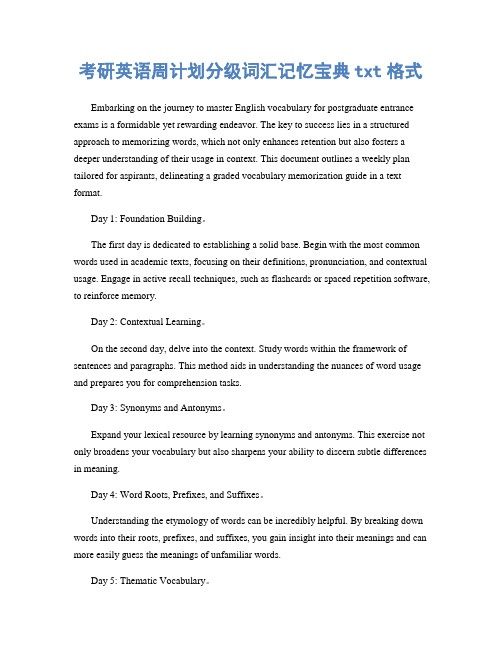
考研英语周计划分级词汇记忆宝典txt格式Embarking on the journey to master English vocabulary for postgraduate entrance exams is a formidable yet rewarding endeavor. The key to success lies in a structured approach to memorizing words, which not only enhances retention but also fosters a deeper understanding of their usage in context. This document outlines a weekly plan tailored for aspirants, delineating a graded vocabulary memorization guide in a text format.Day 1: Foundation Building。
The first day is dedicated to establishing a solid base. Begin with the most common words used in academic texts, focusing on their definitions, pronunciation, and contextual usage. Engage in active recall techniques, such as flashcards or spaced repetition software, to reinforce memory.Day 2: Contextual Learning。
On the second day, delve into the context. Study words within the framework of sentences and paragraphs. This method aids in understanding the nuances of word usage and prepares you for comprehension tasks.Day 3: Synonyms and Antonyms。
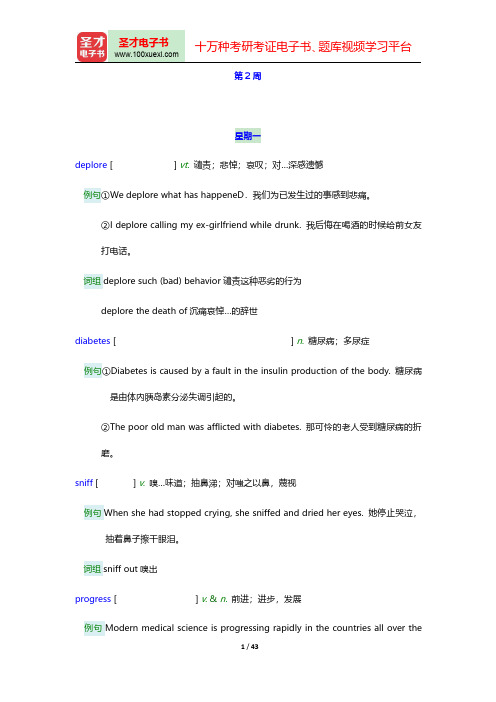
第2周星期一deplore[]vt.谴责;悲悼;哀叹;对…深感遗憾例句①We deplore what has happeneD.我们为已发生过的事感到悲痛。
②I deplore calling my ex-girlfriend while drunk.我后悔在喝酒的时候给前女友打电话。
词组deplore such(bad)behavior谴责这种恶劣的行为deplore the death of沉痛哀悼…的辞世diabetes[]n.糖尿病;多尿症例句①Diabetes is caused by a fault in the insulin production of the body.糖尿病是由体內胰岛素分泌失调引起的。
②The poor old man was afflicted with diabetes.那可怜的老人受到糖尿病的折磨。
sniff[]v.嗅…味道;抽鼻涕;对嗤之以鼻,蔑视例句When she had stopped crying,she sniffed and dried her eyes.她停止哭泣,抽着鼻子擦干眼泪。
词组sniff out嗅出progress[]v.&n.前进;进步,发展例句Modern medical science is progressing rapidly in the countries all over theworld.现代医学在世界各国都进展很快。
词组in progress在进行中,在举行make progress in在…方面取得进步(进展)make progress towards朝着…(目标)前进make progress with把…向前推进;在…方面取得进展punctual[]adj.准时的,正点的例句She is always punctual,but her friend is always late.她总是很守时,可是她的朋友总是迟到。

海文考研英语分级词汇记忆宝典周计划The海文考研英语分级词汇记忆宝典周计划(Haiwen Postgraduate English Level Vocabulary Memory Guide Weekly Plan) is a comprehensive study tool designed to help students preparing for the English language section of the postgraduate entrance exam in China. This plan breaks down the vast amount of required vocabulary into manageable weekly segments, helping students to systematically memorize and retain the necessary words and phrases.The weekly plan is divided into 20 units, with each unit focusing on a specific theme or topic. For example, Unit 1 may cover basic vocabulary related to greetings and introductions, while Unit 2 might focus on academic terms related to a specific field of study. Each unit includes a list of curated vocabulary words along with example sentences to provide context and help students understand how to use the words in context.In addition to vocabulary lists, the weekly plan also includes exercises and quizzes to test students' understanding and retention of the material. These exercises may includefill-in-the-blank sentences, multiple-choice questions, and other interactive activities to reinforce the learning process.By following the海文考研英语分级词汇记忆宝典周计划, students can gradually build their English vocabulary and improve their language skills in a structured and efficient manner. This plan not only helps students prepare for the postgraduate entrance exam but also equips them with the language skills needed for academic and professional success.Overall, the海文考研英语分级词汇记忆宝典周计划is an invaluable resource for students looking to expand their English vocabulary and improve their language proficiency. With its organized approach and engaging exercises, this plan is sure to help students achieve their goals and excel in their English language studies.。
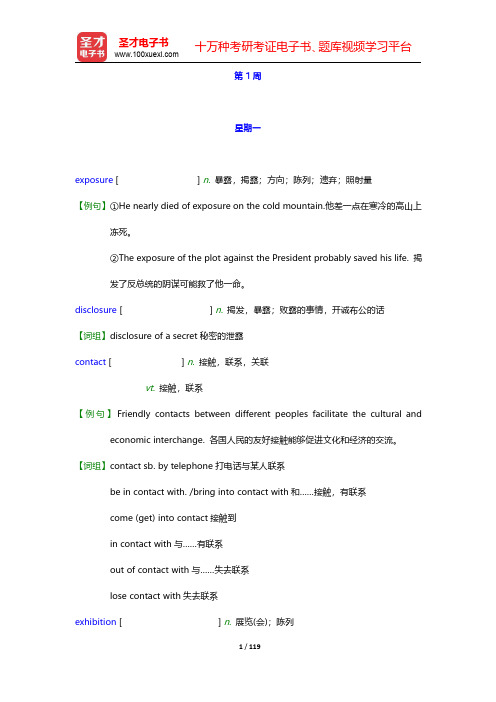
第1周星期一exposure[]n.暴露,揭露;方向;陈列;遗弃;照射量【例句】①He nearly died of exposure on the cold mountain.他差一点在寒冷的高山上冻死。
②The exposure of the plot against the President probably saved his life.揭发了反总统的阴谋可能救了他一命。
disclosure[]n.揭发,暴露;败露的事情,开诚布公的话【词组】disclosure of a secret秘密的泄露contact[]n.接触,联系,关联vt.接触,联系【例句】Friendly contacts between different peoples facilitate the cultural and economic interchange.各国人民的友好接触能够促进文化和经济的交流。
【词组】contact sb.by telephone打电话与某人联系be in contact with./bring into contact with和……接触,有联系come(get)into contact接触到in contact with与……有联系out of contact with与……失去联系lose contact with失去联系exhibition[]n.展览(会);陈列【例句】They are coming to the exhibition as my guests.他们作为我邀请的客人来参观展览会。
【词组】make an exhibition of oneself当众出丑instrument[]n.工具,仪器,器械;乐器【例句】Microscope is a kind of optical instrument.显微镜是一种光学仪器。
default[]vi.拖欠;不履行;不到场n.违约;缺席;缺乏;系统默认值vt.不履行;不参加(比赛等);对……处以缺席裁判【例句】The defendant made default yesterday.被告昨天未到庭。

考研英语分级词汇记忆宝典·周计划Embarking on the journey of postgraduate entrance examinations is a formidable challenge, particularly when it comes to mastering the English language. A structured approach to vocabulary acquisition can significantly enhance one's proficiency and confidence. The following document outlines a weekly plan designed to facilitate the memorization of graded vocabulary, tailored specifically for postgraduate English examinations.Day 1: Establishing the Foundation。
The initial day is dedicated to building a solid base. Begin by familiarizing yourself with the most common academic words. These are the building blocks of scholarly articles, lectures, and textbooks. Allocate time to understand their meanings, usage, and nuances. Engage with each word through sentences that reflect their academic context, thereby cementing their meaning in your memory.Day 2: Expanding the Lexicon。
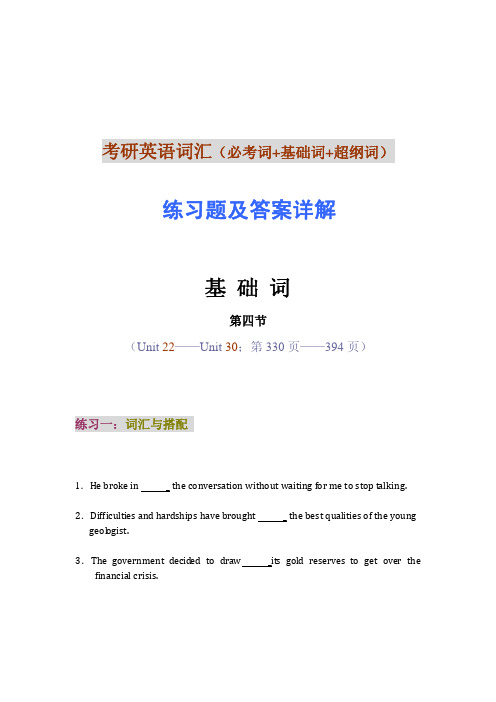
考研英语词汇(必考词+基础词+超纲词)练习题及答案详解基础词第四节(Unit 22——Unit 30;第330页——394页)练习一:词汇与搭配1.He broke in _ the conversation without waiting for me to stop talking.Difficultie _ the best qualities of the young 2.s and hardships have broughtgeologist.3.The government decided to draw _its gold reserves to get over the financial crisis.4.Attendance at football matches have dropped since the coming of television.5.The long‐awaited Hubble Space Telescope, due orbit the Earth next March, will observe some of the ol dest stars in the sky.6.She was so touched by his generosity that for a moment she was a loss for words.It wasn’t so muc _that I just wasn’t interested in the 7.h that I disliked herwhole business.8the translation of a French novel..Mary is occupied _9tea and cakes..We discussed the matter _1purpose.0.I came here for nothing else but to see you _11.Steadily rising prices press most heavily the poor and the old people with fixed incomes.The Russians sent12. up the first sputnik and caught the other nuclear powers surprise.13.His l etter indicated that he loved his daughter and felt proud _her and her success.14.Your improper words will give rise doubts concerning your true intentions.1of sugar. Ask Mrs. Jones to lend us some.5.We’ve run _1having asked such a silly question.6.He was ashamed _17.Women have significant advantages over men in space because they need less food and less oxygen and they stand up _radiation better.18.The future of this company is _ stake: many of its talented employees are flowing into more profitable net‐based businesses.19.He was determined to stick _ the job until the new cutter worked properly.20.We have lunch the stroke of twelve every day.21.She had not once been away from the place for more than thirty hours _a stretch.They, the former opponents, were si22.tting talking sid e by side. I thought mye me.yes were playing tricks23.To finance the program they had to turn to the public the funds they needed.24.Stressful environments lead to unhealthy behaviors such as poor eating habits, which _ turn increase the risk of heart disease.5.His behavior finally provoked her __2 leaving him.26.A really powerful speaker can work __ the feelings of the audience to the fever of excitement.练习二:词汇辨析Police units were with newly recruited men and women.1. __[A]extended[B]exaggerated[C]magnified[D]augmentedWe shall p __ the exact nature of these sub‐atomic 2.robably never be able toparticles.[A]assert[B]impart[C]ascertain[D]notifyIf I take this medici __ my cold.3.ne twice a day, it should[A]recover[B]heal[C]restore[D]cure4.ket and emptied itsShe opened the pac ___ into saucepan.[A]contents[B]content[C]consent[D]contend5.The security guard _ two men who were yelling in the courtroom.[A]expelled[B]propelled[C]repell ed[D]dispelled6.Growing bodies need movement and _ , but not just in ways that emphasize competition.[A]care[B]nutrition[C]exercise[D]leisure7.If most bread winners a day’s pay to the Hope Project, then it will be hopeful.[A]gift[B]present[C]donate[D]giveeciation of their 8.Giving a gift can convey a wealth of meaning about your apprand the importance you place upon the relationship.[A]solidarity[B]priority[C]superiority[D]hospitalityHe glances hum of his spectacles. 9.orously at her from above the[A]rim[B]edge[C]brimD]border[n the United States not to look at someone who is talking to you. 10.I it is[A]rough[B]coarse[C]rude[D]crude11.The moon __around the earth.[A]resolves[B]revolves[C]involvesD]rotates[12.as sent to A police officer w __the crime.[A]search[B]explore[C]survey[D]investigate练习三:英语知识运用1.Families have also changes these years. More families consist of one‐parent working parents; consequently, children are likely to have less e than was common in the traditional family structure.households or two at hom supervision [A]survived[B]noticed[C]undertaken[D]experienced2.The communications revolution has influenced both work and l eisure and how we th about place and time, but there have been think and feel bo views about its l, social and cultural implications.economic, politica [A]competitivesial[B]controver [C]distracting[D]irrational3.Antarctic differs fundamentally from the Arctic regions. The Arctic is an ocean,_______with drifting packed ice and surrounded by the land masses of Europe, merica. The Antarctic is a continent nearly as large as Europe and d, Pacific, and Indian Oceans.Asia, and North A combine Australia [A]coveredcted[B]filled[C]conne [D]lined4.But if we are going to allow fast motor‐cycles and heavy diesel lorries to pass gh residential and business districts, the community must decide on to continuously throu needs the control it , for in the long run it has got to pay for it.[A]practice[B]exerciseC]obtain] a [[D cquire5.Growing bodies need movement and , but not just in ways that emphasize co[A]caren[B]nutritio [C]exercise[D]leisure6.Americans today have different eating habits than in the past. They have a broader e of knowledg , so they buy more fresh fruit and vegetabl es than ever before. show the way people live determines the way they eat.Statistics [A]food[B]dietC]nutrition[[D]hygiene7.By the most conclusive and satisfactory definition, reading is the ability to unlock the sound‐symbols code of the language, to interpret meaning for various , at and at various levels of difficulty, and to do so wid ely and ly.various rates, al senthusiastic e s[A] purpos [B] degree C]stages[[D]steps8.Although a natural alternative, such as honey, can be used to sweeten food if this is necessary, we can in fact do without it. Nowadays fibre is considered to be an art of a healthy diet. In white bread, for example, the fibre has been is important p removed. But it in unrefined flour and of course in vegetables.[A]current[B]substantia C]presentl[[D]essential9.In the 1920’s, but in the Depression conditions of the 1930’s, the United States experienced a declining birth rate—every thousand women aged fifteen to forty‐four gave birth to about 118 live children in1920,89.2 in 1930,75.8 in 1936, and 80 in 1940.[A]extraordin yar [B]speciallyC]especially[[D]specifically10.The goals of revolutionaries are commonly the overthrow of a government, basic change in the political and economic system, and more generally a basic change in the stratification system in the country. Because of the extent of change sought, revolutions are always accompanied by extensive violence. The are so high kill to prevent the revolution, and revolutionaries must be ready to goals.that opponents will e their kill to achiev [A]stakesrs[B]dange C]odds[[D]risks11. Part of the problem is that many homeless adults are addicted to alcohol or drugs. And a significant number of the homeless have serious mental disorders. Many others, or mentally ill, simply lack the everyday life skills need to turn their while not addicted lives .[A]aroundr[B]ove [C]on[D]up12.Though young people feel free to choose their friends from groups, most choose a mate of similar background. This is due in part to parental guidance. Parents ses for their children, but they can usually influence choices by l of someone they consider unsuitable.cannot sel ect spou prova voicing disap [A]similarial[B]identicalC]different D] diverse[[13.They claim that our highly evolved brain provides us an innate(天生的) language ability not found in lower organisms. Proponents of this innateness theory tial for language is inborn, but that language itself develops gradually, e growth of the brain during childhood.say that our poten n of th as a functio [A]forinsth[B]aga C]wit D]of[[14.Men seem to have always taken an interest in meteorites, but not until the early nineteenth century since then these objects considered worth for scientific , people believed that because meteorites fell from the heavens, themselves or messengers from the gods.study. In the beginning r gods edthey were eithe [A]to be preserv [B]preserving[C]to preserve[D]being preserved练习四:语法与词汇1.u must be ready to take the_______.If you refuse to do it, yo A.consequenceB.effecteC.outcom .resultD 2.We cannot hope to solve the problems of industrial life, many of which arise directly from the frustrations created by inequality at work, _______we tackle it head‐on.A.provid edB.asC.unlessD.when3.They had a fierce _______as to whether their company should restore the trad e h was broken years ago.relationship whic A.debateB.clashmentC.disagree .contestD4.The children cheered up when they saw hundreds of colorful balloons _______slowly into the sky.A.floatingB.raisingC.heavingD.ascending5.With a teacher like Mr. Brown, the _______method used in the classroom was by no means standardized.A.traditionalB.learningC.pedagogicalD.pococurante6.One cause of the Civil War was economic and political rivalry between the ________South and the industrial North.A.agrarianB.prosperousC.old‐fashionedD.poorly organized7.Photojournalist Margaret became famous for her ________of significant eventsWorld War.during the SecondA.collageageC.camouflageD.coverage8.When the glaciers ________after the last ice age, the five Great Lakes of North America were formed.A.advancedB.evaporatedC.thawedD.explodedTeachers of young child9.ren should ________avoid ridicule and sarcasm.A.theoreticallyB.naivelyC.scrupulouslyB.confidently10.Major earthquakes are among nature’s most decaying events, causing an ________loss of life and property.A.unmentionableB.unprofitableC.insurmountableD.incalculable11.Mercury’s ________is so much greater than the Earth’s that it completes more than four revolutions around the Sun in the time it takes the Earth to complete one.A.velocityB.orbitC.weightD.diameter答案及详解练习一1.break in 接on (upon) someone 或someone’s conversation 或activity “打断”。
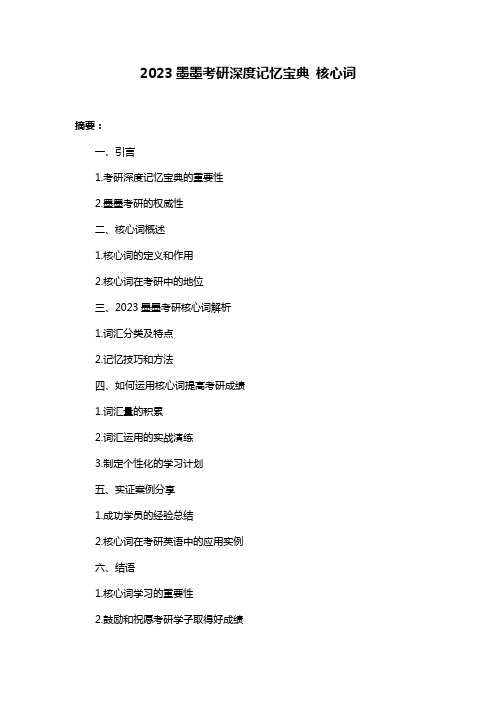
2023墨墨考研深度记忆宝典核心词摘要:一、引言1.考研深度记忆宝典的重要性2.墨墨考研的权威性二、核心词概述1.核心词的定义和作用2.核心词在考研中的地位三、2023墨墨考研核心词解析1.词汇分类及特点2.记忆技巧和方法四、如何运用核心词提高考研成绩1.词汇量的积累2.词汇运用的实战演练3.制定个性化的学习计划五、实证案例分享1.成功学员的经验总结2.核心词在考研英语中的应用实例六、结语1.核心词学习的重要性2.鼓励和祝愿考研学子取得好成绩正文:一、引言随着考研竞争的日益激烈,考生们纷纷寻求各种提高考试成绩的方法。
在这个过程中,一本好的词汇书籍显得尤为重要。
墨墨考研的《2023墨墨考研深度记忆宝典核心词》正是这样一本权威、实用的考研词汇书籍,帮助考生轻松应对考研挑战。
二、核心词概述1.核心词的定义和作用核心词,顾名思义,是考研词汇中的关键部分。
它们在考研英语试题中出现频率高,对于理解和解题具有举足轻重的作用。
掌握核心词,就等于掌握了考研英语的命脉。
2.核心词在考研中的地位在考研英语中,核心词的重要性不言而喻。
它们贯穿在整个考试的各个部分,如阅读理解、完形填空、翻译等。
熟练运用核心词,将极大提高考研英语的做题速度和正确率。
三、2023墨墨考研核心词解析1.词汇分类及特点《2023墨墨考研深度记忆宝典核心词》按照词汇在考研英语中的出现频率和重要性,分为多个级别。
每个级别中的词汇都有详细的释义、例句和用法,帮助考生深入理解词汇含义。
2.记忆技巧和方法书中提供了丰富的记忆技巧和方法,如词根词缀法、联想记忆法等。
这些方法不仅有助于考生快速记忆词汇,还能提高词汇理解和运用能力。
四、如何运用核心词提高考研成绩1.词汇量的积累要想在考研英语中取得好成绩,首先要积累足够的词汇量。
考生可以根据自己的基础,选择合适的词汇书籍和计划进行学习。
2.词汇运用的实战演练在积累词汇的基础上,考生需要通过做题来检验自己的词汇掌握程度。

海文考研英语分级词汇记忆宝典周计划Week Plan for Memorizing Vocabulary in the "Sea Essay Postgraduate English Graded Vocabulary Memory Treasury"I plan to spend 10 hours a week memorizing vocabulary in the "Sea Essay Postgraduate English Graded Vocabulary Memory Treasury". I will divide the 10 hours into small study sessions to ensure efficient learning.In the first 3 hours, I will focus on memorizing 100 new words and their meanings. I will use flashcards and repetition techniques to help me remember the words more effectively.During the next 2 hours, I will review the words I memorized in the previous sessions. I will do exercises and quizzes to test my memory and understanding of the words.In the following 3 hours, I will work on using the new words in sentences and paragraphs. I will write short essays using the new vocabulary to reinforce my understanding and usage of the words.In the last 2 hours, I will engage in speaking and listening exercises. I will find a language partner or uselanguage learning apps to practice using the new vocabulary in conversations.周计划我计划每周花费10个小时来记忆《海文考研英语分级词汇记忆宝典》中的词汇。
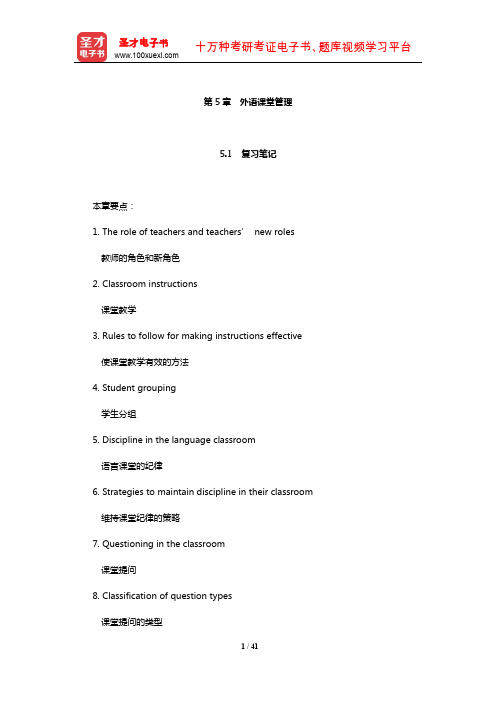
第5章外语课堂管理5.1 复习笔记本章要点:1. The role of teachers and teachers’new roles教师的角色和新角色2. Classroom instructions课堂教学3. Rules to follow for making instructions effective 使课堂教学有效的方法4. Student grouping学生分组5. Discipline in the language classroom语言课堂的纪律6. Strategies to maintain discipline in their classroom 维持课堂纪律的策略7. Questioning in the classroom课堂提问8. Classification of question types课堂提问的类型9. The distinction between mistakes and errorsmistakes 和errors的区别10. Deal with spoken errors处理口头错误本章考点:教师的角色:设计者;管理者;评定者;组织者等以及教师的新角色;课堂教学的定义以及使课堂教学有效的方法;学生分组的几种类型及分组方式;纪律和无纪律的概念;维持纪律的方法;课堂问题的类型及相关定义;mistakes和errors的区别;如何处理口头错误。
本章内容索引:ⅠDefiniton of classroom managementⅡ. The role of the teacher1. Before the class2. During the class3. After the classⅢ. Classroom instructionsⅣ. Student grouping1. The most common student groupings2. Grouping methodsⅤ. Discipline in the language classroom1. Discipline vs. indiscipline2. Maintaining disciplineⅥ. Questioning in the classroom1. Classification of question typesⅦ. Dealing with errors1. The distinction between mistakes and errors:2. Dealing with spoken errors3. Time for correctting4. Ways for correcttingⅧ. ConclusionⅠ. Definiton of classroom management(课堂管理的定义)Classroom Management refers to the way teachers organize what goes on in the classroom.课堂管理指的是教师组织课堂进行的方式、方法。

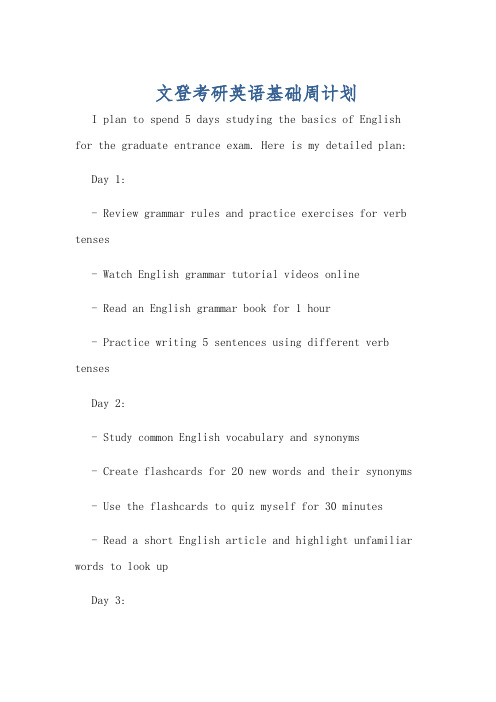
文登考研英语基础周计划I plan to spend 5 days studying the basics of English for the graduate entrance exam. Here is my detailed plan: Day 1:- Review grammar rules and practice exercises for verb tenses- Watch English grammar tutorial videos online- Read an English grammar book for 1 hour- Practice writing 5 sentences using different verb tensesDay 2:- Study common English vocabulary and synonyms- Create flashcards for 20 new words and their synonyms - Use the flashcards to quiz myself for 30 minutes- Read a short English article and highlight unfamiliar words to look upDay 3:- Focus on improving listening skills- Listen to English podcasts or news for 1 hour- Take notes on the main points and new vocabulary- Practice summarizing the content in English for 20 minutesDay 4:- Work on reading comprehension and speed- Read an English passage and answer comprehension questions- Time myself to read a passage and answer questions within a time limit- Look up any unfamiliar words and review their meanings Day 5:- Review all the topics studied in the past 4 days- Complete a practice exam for English basics- Identify areas of weakness and review them- Set goals for further improvement in English中文翻译:我计划花5天时间来学习研究生入学考试英语基础知识。

考研英语周计划【重点核心词汇+练习题详解】第10周星期一lyric[]n.抒情诗,歌词adj.(供)吟唱的,抒情的【例句】①Ode to the West Wind is a good example of Shelley’s lyric poetry.《西风颂》是雪莱抒情诗的范例。
②The anthology reveals a prejudice in favour of lyric poets.这部选集显示出对抒情诗人有所偏爱。
【词组】lyric poetry抒情诗lyric prose抒情散文marathon[]n.[体]马拉松赛跑(全长42,1954米),耐力的考验adj.马拉松式的;有耐力的vi.参加马拉松赛跑【例句】①The meeting was a bit of a marathon.那会议有些像马拉松。
②After running in the marathon,she was flat out for a week.她参加马拉松比赛后一星期都疲惫不堪。
【词组】marathon match时间拉得很长的比赛marathon race马拉松赛跑abound[]vi.大量存在;(in,with)充满,富于【例句】Antimony abounds in our country.我国盛产锑。
【词组】abound in/with sth.有大量某物abide[]vi.(abode,abided)(by)坚持;遵守vt.忍受,容忍,承受【例句】She can’t abide watching horror films.她不能看恐怖电影。
【词组】abide by遵守…,依从…quench[]v.熄灭,扑灭;压制;解(渴)【例句】The disapproval of my colleagues quenched my enthusiasm for the plan.同事们的反对减低了我对这项计划的热情。
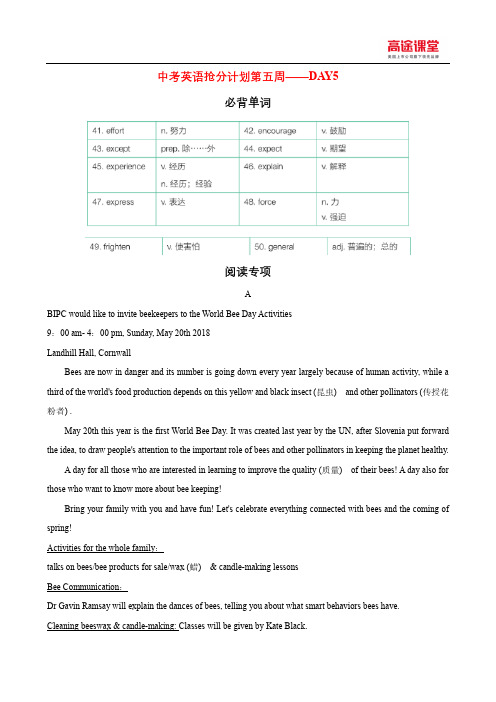
中考英语抢分计划第五周——DAY5必背单词阅读专项ABIPC would like to invite beekeepers to the World Bee Day Activities9:00 am- 4:00 pm, Sunday, May 20th 2018Landhill Hall, CornwallBees are now in danger and its number is going down every year largely because of human activity, while a third of the world's food production depends on this yellow and black insect (昆虫) and other pollinators (传授花粉者) .May 20th this year is the first World Bee Day. It was created last year by the UN, after Slovenia put forward the idea, to draw people's attention to the important role of bees and other pollinators in keeping the planet healthy.A day for all those who are interested in learning to improve the quality (质量) of their bees! A day also for those who want to know more about bee keeping!Bring your family with you and have fun! Let's celebrate everything connected with bees and the coming of spring!Activities for the whole family:talks on bees/bee products for sale/wax (蜡) & candle-making lessonsBee Communication:Dr Gavin Ramsay will explain the dances of bees, telling you about what smart behaviors bees have.Cleaning beeswax & candle-making: Classes will be given by Kate Black.Cafe: Lunch and tea/coffee/cakes are available at the cafe.These activities are held by BIPC, the Bee Improvement Program for Cornwall.Tickets are 8 for members of BIPC and 10 for non-members. Half price for a child.All the money will go to the City Bee Protection Project.Book your place by emailing bengreen@1. The danger that bees are facing is caused by ________.A. beekeepersB. food productionC. human activityD. other pollinators2. The World Bee Day was created ________.A. to advise people to keep healthyB. to help beekeepers sell more bee productsC. to celebrate the coming of springD. to make people know the importance of bees3. During the activities, you can learn all the following EXCEPT ________.A. to make a candleB. to improve the quality of beesC. to make tea and coffeeD. to understand the dances of bees4. Bill, a member of BIPC, and his 5-year-old son will pay ________ for tickets to the activities.A. 10 dollarsB. 12 dollarsC. l6 dollarsD. l8 dollars5. The money from the sales of tickets ________.A. will be used to protect beesB. will make BIPC very richC. will be given to beekeepersD. will be spent on the celebrationsBThere's much to see under the sea, but you need to remember that light behaves differently in water than in air. The objects appear closer to you than they exactly are. You might find yourself reaching out to touch something and completely missing it.Objects under water will appear larger than they would on the surface, too. Be careful not to tell any stories about the big fish that got away. That fish might not be so big after all! It's just because sometimes things can seem to be as much as about 33 percent bigger in water!What's more, in deeper water, colors just don't seem as bright. In fact, it looks as if some colors are missing. Remember the color of an object results from the wavelengths (波长) of light that are reflected (反射) from its surface. And light is taken in as it moves down through the water.Swimmers wear wet suits to keep warm underwater. Let's take a bright red, yellow, and blue wet suit as an example. These colors are hard to miss on the surface of water. Watch carefully the changes in color as you descend in the water. The red part now looks almost black because the red light wavelengths, the longest among these three colors, are missing. As you go down deeper, the same thing will happen to the yellow part and in the end to the blue part. Even at a place of about 6 to 9 meters underwater, you will look terrible, like a ghost (鬼怪) ! And you have to wait for your return to the surface to enjoy the bright colors again!6. You miss the object underwater when you want to touch it because ________.A. your eyesight is quite poorB. you are not quick enoughC. it is not as close as it seemsD. it disappears very quickly7. The example of the wet suit is used to explain the change of ________ of an object underwater.A. the sizeB. the colorC. the positionD. the weight8. The underlined word "descend" probably means ________ in Chinese in this passage.A. 上升B. 漂浮C. 屏息D. 下潜9. Which of the fo1lowing is true?A. A four-meter-long fish looks three meters long underwater.B. The wavelengths of red light are longer than those of blue light.C. Much water will be taken in by the swimmer deep in the water.D. You will see a ghost if you go as deep as 6 to 9 meters into the sea.10. The best title of this passage is ________.A. The Standard of Color UnderwaterB. The Direction of Light UnderwaterC. The Brightness of Color UnderwaterD. The Behavior of Light UnderwaterC11. ________ 12. ________ 13. ________ 14. ________ 15. ________。
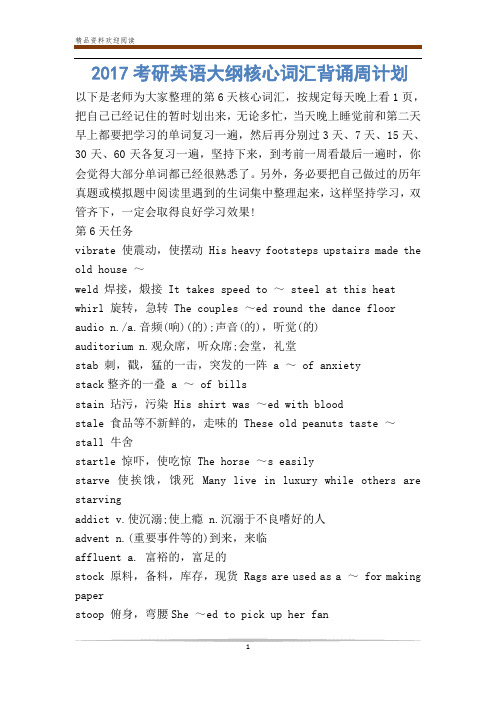
2017考研英语大纲核心词汇背诵周计划以下是老师为大家整理的第6天核心词汇,按规定每天晚上看1页,把自己已经记住的暂时划出来,无论多忙,当天晚上睡觉前和第二天早上都要把学习的单词复习一遍,然后再分别过3天、7天、15天、30天、60天各复习一遍,坚持下来,到考前一周看最后一遍时,你会觉得大部分单词都已经很熟悉了。
另外,务必要把自己做过的历年真题或模拟题中阅读里遇到的生词集中整理起来,这样坚持学习,双管齐下,一定会取得良好学习效果!第6天任务vibrate 使震动,使摆动 His heavy footsteps upstairs made the old house ~weld 焊接,煅接 It takes speed to ~ steel at this heat whirl 旋转,急转 The couples ~ed round the dance floor audio n./a.音频(响)(的);声音(的),听觉(的)auditorium n.观众席,听众席;会堂,礼堂stab 刺,戳,猛的一击,突发的一阵 a ~ of anxietystack整齐的一叠 a ~ of billsstain 玷污,污染 His shirt was ~ed with bloodstale 食品等不新鲜的,走味的 These old peanuts taste ~stall 牛舍startle 惊吓,使吃惊 The horse ~s easilystarve 使挨饿,饿死Many live in luxury while others are starvingaddict v.使沉溺;使上瘾 n.沉溺于不良嗜好的人advent n.(重要事件等的)到来,来临affluent a. 富裕的,富足的stock 原料,备料,库存,现货 Rags are used as a ~ for making paperstoop 俯身,弯腰She ~ed to pick up her fanstatistics 统计,统计资料The recent ~on marriage are interestingsteer 掌舵,驾驶~ a car through the entranceauthentic a.真的,真正的;可靠的,可信的,有根据的awe n.敬畏,惊惧vt.使敬畏,使惊惧bait n.饵,引诱物 vt.用饵引诱;招惹,捉弄balcony n.阳台;(电影院等的)楼厅,楼座ballet n.芭蕾舞,芭蕾舞剧;芭蕾舞团bizarre adj.异乎寻常的,稀奇古怪的stubborn 顽固的,倔强的 The ~ boy refused to listen to his parentsadvicestuff 原料,材料,物品,东西 He has got all the ~ ready for building his new housesubject 题目,主题 the ~ for a debatesubmerge 浸没,淹没,湮没 The stream overflowed and ~d the farmlandsubmit 屈服,服从,投降~ to foreign pressureanguish n.(尤指心灵上的)极度痛苦,烦恼antique a.古式的,过时的 n.有价值的古物,古董appall v.使胆寒,使惊骇 (a. appalling)wrap 包,裹~ oneself in a blanketwreck 失事,遇难 a train ~wrench 扳手 He is a ~ .ballot n.(不记名)投票;投票总数;投票权 vi.投票barbecue n.烤肉用的台架;烤肉野餐 vt.在台架上烤肉barren a.贫瘠的;不育的;(植物)不结果的;无用的belly n.肚子,腹部;(像肚子一样)鼓起的部分,膛benign a.(病)良性的,(气候)良好的,仁慈的,和蔼的在最后的冲刺阶段,广大考生应该有针对性的去复习,希望广大考生都能考个好成绩!为了帮助考生更好地复习,为广大学子推出2017考研冲刺集训营、专业课一对一、乐学系列备考专题,针对每一个科目要点进行深入的指导分析,还会根据每年的考研大纲进行针对性的分析哦~欢迎各位考生了解咨询。
考研英语周计划【重点核心词汇+练习题详解】
第5周
星期一
ethic[]n.道德规范,伦理
【例句】Our professional ethic enjoins us to stay uncommitted and report the facts.
我们的职业道德要求我们要保持中立,报道事实真相。
【词组】work ethic职业道德;职业伦理
professional ethic职业道德
fiscal[]adj.财政的,国库税收的,会计的
n.检察官;印花税票
【例句】The value of the US dollar will continue to diminish,along with Americans’s fiscal freedom.美元将随着美国财经自由的日益缩小而继续贬值。
【词组】fiscal revenue财政收入
fiscal deficit财政赤字
fiscal budget财政预算
fiscal crisis财政危机
struggle[]v.&n.斗争,奋斗,努力;挣扎
【例句】We had a struggle to stop the criminal.我们为截住罪犯进行了搏斗。
【词组】be in one’s death bed struggle进行垂死挣扎
struggle after为……而奋斗
submerge[]v.浸没,淹没;潜水
【例句】I’m absolutely submerged in work.我工作多得不得了。
massacre[]n.残杀,大屠杀
v.残杀,集体屠杀
【例句】Highways are responsible for the massacre of the countryside.高速公路破坏了乡村的景观。
drag[]v.拖曳
【例句】The cat was dragging its broken leg.那只猫拖着断腿吃力地走。
【词组】walk with dragging feet踯躅而行
drag sb.out to硬拖某人去……
drag on/out拖延
response[]n.回答,回音;反应,响应
【例句】I’ve had no response to my letter.我还没有回信。
retort[]v.反击;反驳,回嘴
【例句】“It’s none of your business”he retorted.“你管不着!”他反驳道。
avail[]v.有益于,有用,有帮助
n.[一般用于否定句或疑问句中]效用,利益
【例句】Nothing could avail the dying patient.没有任何东西能挽救那个濒死者。
【词组】of little avail有点儿用
without avail无效
of/to no avail无用
avail oneself of利用
pirate[]n.海盗;非法盗印者,侵犯版权者;无执照广播者
v.盗版
【例句】These pirate copies are of poor quality.这些盗版书质量很差。
confuse[]vt.使混乱,混淆,弄错
【例句】They asked me so many questions that I got confused他们问了我许许多多的问题,把我弄糊涂了。
【词组】confuse accounts搞乱账目
be confused in mind心烦意乱
confuse...with把……认为
confuse the enemy迷惑敌人
introduce[]vt.介绍;引进;提出(议案等);采用
【例句】①He introduced his friend to me.他把朋友介绍给我。
②The chairman introduced the lecturer to the audience.主持人把演讲者介
绍给听众。
invest[]v.投资;花费(时间、精力等)
【例句】They invested their savings in stocks and bonds.他们将积蓄投资于股票和债券。
spray[]n.喷雾;飞沫;浪花
vt.喷射,喷溅
【例句】The seed was sprayed over the ground in huge quantities by aeroplanes.飞机把这些草籽大量地撒在地面上。
nourish[]v.提供养分,养育;怀有(希望,仇恨等)
【例句】This fertilizer will nourish the soil.这种肥料可使土壤肥沃。
【词组】nourishing food有营养的食物
nourish feelings of hatred怀恨在心
conform[]vi.(to)遵守,适应;相似;一致,符合
【词组】confirm...with/to...使……与…一致
discipline[]n.纪律;学科
v.约束;训练;惩罚
【例句】The soldiers showed perfect discipline under the fire of the enemy.在敌人的炮火下,那些士兵显示了良好的纪律。
【词组】be strict in discipline纪律严明
discrepancy[]n.相差;差异;矛盾
【例句】There was a discrepancy in the two reports of the accident.关于那次事故的两则报道有不一致之处。
specification[]n.详述;(常pl.)规格;详细说明书;
清单
【例句】She made careful specification as to the kinds of cakes and candy needed for her party.她详细列明了晚会所需要蛋糕和糖果的种类。
stalemate[]n.僵持阶段,僵局
【例句】The fight resulted in a stalemate.战斗形成对峙局面。
星期二
influential[]adj.有影响的;有势力的
【例句】His father was an influential Democrat.他父亲是个有影响的民主党人。
incentive[]n.刺激,鼓励;动力;诱因;动机
【例句】He’s got no incentive to work.他没有工作的动力。
archaeology[]n.考古学
【例句】Archaeology is a source of history,not just a humble auxiliary discipline.考古学是历史学的一个来源,而不是地位卑微的辅助学科。
【词组】Industrial archaeology工业考古学;工业考古;产业考古学
plain[]n.平原,旷野
adj.平易的,易懂的;简单的,朴素的;坦率;平凡
【例句】She wore a plain brown dress.她穿了一件普通的棕色衣服。
【词组】the Great Plains of the US美国的大平原
plain clothes便衣
poisonous[]n.有毒的;有害的;恶毒的
【例句】This medicine is poisonous if taken in large quantities.这种药如服过量是会中毒的。
harmony[]n.协调,和谐;融洽,一致
【例句】My cat and dog live in perfect harmony.我的猫和狗相处得十分和睦。
【词组】in(out of)harmony(with)(与…)(不)协调一致,(与…)(不)和睦融洽
hazard[]n.冒险,危险,危害
v.冒险,拼命
【例句】There are many hazards in a journey across Africa.穿越非洲的旅行有许多危
险。
【词组】at all hazards不顾一切风险;在任何情况下
at hazard胡乱地;侥幸地;在危险中,受到威胁
in hazard在危险中,受到威胁
at the hazard of拼着
blind hazard一种纸牌戏;盲目的冒险
by hazard偶然,碰运气
losing hazard(弹子球比赛中)打出的球与他球相撞后落入袋中
make a hazard猜测;碰碰运气
on the hazard在危险中;受到威胁
run the hazard冒险
winning hazard(弹子戏中)打出的球与他球相撞后使他球落入袋中
dilemma[]n.困境,窘境
【例句】The ideas of how to help their company get out of dilemma occupied the proscenium of his mind.他首先想的是怎样帮助他们的公司走出困境。
【词组】be in a dilemma左右为难
put sb.into a dilemma使人左右为难,使人进退两难
paradox[]n似是而非的话语;矛盾的事物
【例句】“More haste,less speed”is a paradox.“欲速则不达”是似是而非的言论。
premise[]n.前提;
(pl.)房屋(及其附属建筑、基地等),经营厂址
v.预先提出;作为……的前提。